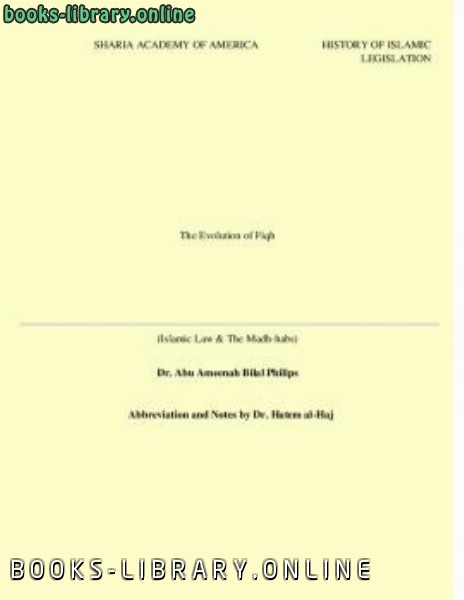📘 ❞ Evolution of Fiqh ❝ كتاب ــ بلال فليبس
كتب إسلامية بلغات أخرى - 📖 كتاب ❞ Evolution of Fiqh ❝ ــ بلال فليبس 📖
█ _ بلال فليبس 0 حصريا كتاب ❞ Evolution of Fiqh ❝ 2024 Fiqh: For a proper understanding the historical development Islamic law, terms and Sharee‟ah need to be defined has been loosely translated into English as “Islamic law” and so Sharee‟ah, but these are not synonymous either in Arabic language or to the Muslim scholar Fiqh literally means true what is intended An example this usage can found Prophet Muhammad‟s statement: “To whomsoever Allaah wishes good, He gives (true understanding) Religion”1 Technically, however, refers science deducing laws from evidence sources law By extension it also body Islamic laws deduced Sharee‟ah, means, waterhole where animals gather daily drink, the straight path Qur‟anic verse “Then we put you on straight (Sharee‟ah) affairs, follow and do not follow desires those who have no knowledge ” Soorah al Jaathiyah (45): 18 Islamically, however sum total which were revealed the Prophet Muhammad (SW ) recorded Qur‟aan well deducible from the Prophet‟s divinely guided lifestyle (called Sunnah)2 From previous two definitions, following three differences may deduced: 1 Sharee‟ah both Sunnah, while from cover specific situations directly treated 2 fixed unchangeable, whereas changes according the circumstances under applied 3 The are, for most part, general: they lay down basic principles In contrast, tend specific: demonstrate how of Sharee‟ah should given circumstances 1 Reported by Mu„aawiyah collected Bukhaaree (Sahih Al Bukhari (Arabic English), vol 4, pp 223 4, no 346), Muslim, (Abdul Hamid Siddiqi, Sahih (English Trans ), (Beirut: Dar Arabia, n d 3, p 1061, 4720), at Tirmidhee others 2 9 Shalabee, all Madkhal fee Ta‟reef bil fiqh Islaamee, Daar an Nahdah Arabeeyah, 1969), 28 This great trial Dr, Hatem abbreviate book Sh Abu Ameenah Bilal Philips overall purpose this acquaint reader with factors behind formulation , order that he she better understand why various schools Madhhabs came about كتب إسلامية بلغات أخرى مجاناً PDF اونلاين هذا القسم يشمل العديد من الكتب الإسلامية المترجمة بجميع اللغات العالمية منها : ***Islamic Books***: الأقسام الفرعية English إنجليزي Français فرنسي Español أسباني Indonesian إندونيسي Türkçe تركي فارسی فارسي اردو أردو Deutsch ألماني Italiano إيطالي বাংলা بنغالي Русский روسي हिन्दी هندي മലയാളം مليالم ไทย تايلندي Filipino فلبيني Shqip ألباني አማርኛ أمهري Bosanski بوسني Polski بولندي 中文 صيني Português برتغالي 한국어 كوري 日本語 ياباني
- مساهمة من: NOOR
( الأربعاء 27 مارس 2019 ( 8:16 مساءً )) - تبليغ عن سوء استخدام

For a proper understanding of the historical development of Islamic law, the terms Fiqh and
Sharee‟ah need to be defined. Fiqh has been loosely translated into English as “Islamic law”
and so has Sharee‟ah, but these terms are not synonymous either in the Arabic language or to
the Muslim scholar.
Fiqh literally means the true understanding of what is intended. An example of this
usage can be found in the Prophet Muhammad‟s statement: “To whomsoever Allaah wishes
good, He gives the Fiqh (true understanding) of the Religion”1
.
Technically, however, Fiqh refers to the science of deducing Islamic laws from
evidence found in the sources of Islamic law. By extension it also means the body of Islamic
laws so deduced.
Sharee‟ah, literally means, a waterhole where animals gather daily to drink, or the
straight path as in the Qur‟anic verse.
“Then we put you on a straight path (Sharee‟ah) in you affairs, so follow it and do not
follow the desires of those who have no knowledge.” Soorah al-Jaathiyah (45): 18.
Islamically, however it refers to the sum total of Islamic laws which were revealed to the
Prophet Muhammad (SW.) and which are recorded in the Qur‟aan as well as deducible from
the Prophet‟s divinely-guided lifestyle (called the Sunnah)2
From the previous two definitions, the following three differences may be deduced:
treated in Sharee‟ah law.
Sharee‟ah should be applied in given circumstances.
1 Reported by Mu„aawiyah and collected by al-Bukhaaree (Sahih Al-Bukhari (Arabic-English), vol.4, pp. 223-4,
no.346), Muslim, (Abdul Hamid Siddiqi, Sahih Muslim (English Trans.), (Beirut: Dar al-Arabia, n.d.), vol.3, p.
1061, no.4720), at Tirmidhee and others.
2
9 Muhammad Shalabee, all-Madkhal fee at-Ta‟reef bil-fiqh al-Islaamee, (Beirut: Daar an-Nahdah al-
Arabeeyah, 1969), p. 28.
This is a great trial from Dr, Hatem to abbreviate the book of Sh. Abu Ameenah Bilal Philips . The overall purpose of this book is to acquaint the reader with the historical factors behind the formulation of Islamic law Fiqh , in order that he or she may better understand how and why the various schools of Islamic law Madhhabs came about.

